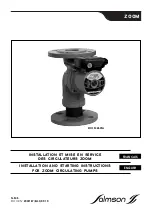
©Copyright 2014 Liberty Pumps Inc. All rights reserved 5
2.
This manual was prepared to assist you in the correct installation, operation, and maintenance of your Liberty
Pumps product. Before Installation, read the following instructions carefully. Each Liberty pump is individually
factory tested to provide proper performance. Liberty pumps are designed for minimal maintenance. However,
regular inspections will ensure longer life and greater operating reliability. Make certain that you understand the
chapters on electrical connection and mechanical installation before starting the installation of your Liberty pump.
By closely following these instructions, potential operating problems should be eliminated, providing years of
trouble-free service.
2-1
INTRODUCTION
WARRANTY:
Repair work carried out during the warranty period without Liberty Pump’s prior approval may
render the warranty void.
SERIAL #:
In all correspondence and reports with Liberty Pumps, provide the pump serial number to ensure that
you receive the proper information and replacement parts.
2-2
INSPECTION UPON RECEIPT
The shipping container should be immediately inspected for damage that may have occurred during shipment.
Exercise care in opening the shipping container to avoid damage to the pump and its power cord. Remove any
blocking and cushioning from within the container.
Check all cushioning for spare parts before discarding. Visually check the pump and any spare parts for damage.
Check for damaged electrical wires, especially where they exit the motor housing. Contact the Liberty Pumps
Customer Service Department to report any damage or shortage of parts. Turn the sewage pump’s impeller
through several rotations. This will ensure that the impeller is free of any seizure due to prolonged storage. If the
impeller is not rotated manually prior to installation, the pump may fail to start. If the impeller’s rotation is difficult
or completely resistant, contact the Liberty Pumps Customer Service Department.
2-3
STORAGE BEFORE USE
1.
If it is necessary to store a pump for a long period of time, it should be stored indoors in a clean, dry,
temperature-stable environment. The pump should be covered to protect it from dirt and water. The ends of
the cables must be protected against moisture.
2.
Prior to installation, and with the power off, rotate the impeller by hand to verify movement
and lubricate the seals.
Introduction
Do not turn impeller by hand if the pump is energized.
Doing so creates an electrical shock hazard.
Only place the pump in a wet pit when it can be operated.
Water can wick through the power cord into the pump
causing an electrical short from the pump to its
surroundings.
Only place the pump in a wet pit when it can be operated. Storing the
pump in an incomplete wet pit can cause extreme corrosion which can
fuse rotating and stationary parts together, causing damage to the
pump when operated.






































